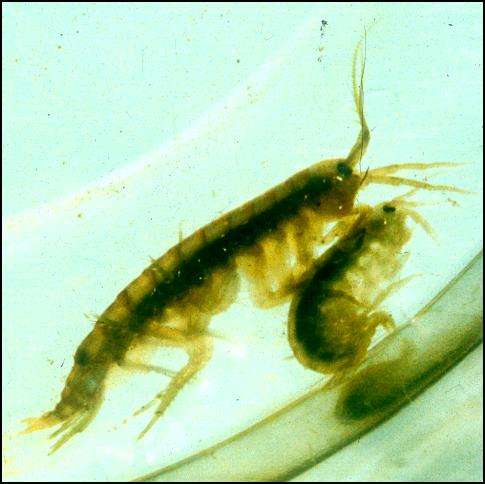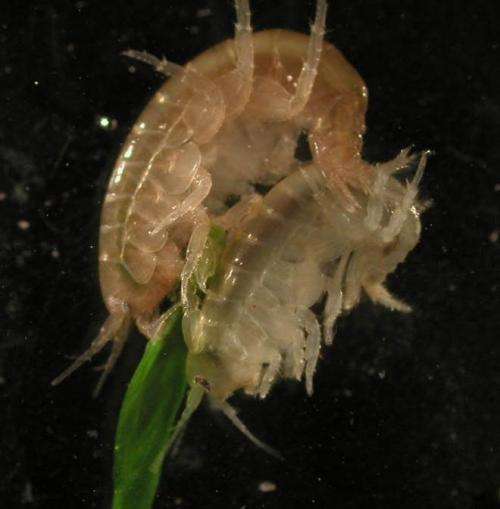March 18, 2015 report
Researchers find instance of parasites fueling cannibalism

(Phys.org)—A small team of researchers with members from institutions in the U.K. and South Africa, has found evidence that suggests parasites infecting a certain type of shrimp leads to a higher incidence of cannibalism. In their paper published in Royal Society Open Science, the team discusses their study of a type of shrimp that lives off the coast of Ireland and what they discovered about parasites that infest them.
Scientists have known for some time that parasitic behavior can cause a host to modify its behavior in ways that benefit the parasite. One parasitic wasp for example, stuns its ladybug host into serving as a guard for its larvae, and in another case a type of tapeworm causes a host fish to swim faster or slower to reduce or increase its chances of being eaten by larger prey. Now it appears that certain types of parasites can also increase the chances of a host becoming cannibalistic.
The team was studying the shrimp Gammarus duebeni celticus, and the parasites that infest them, known as Pleistophora mulleri—very tiny creatures that make themselves at home in the shrimp's muscles. Because they are so small, one or two of the parasites do not have much of an impact, but as they multiply to thousands, the team found, they can have a dramatic impact on how the shrimp host behaves. Adult shrimp that were heavily infested were found to eat substantially more of their own young, than did those that were not infested.
The team believes the cannibalistic behavior is caused by the increased food demand of the parasite, and the reduced ability of the host to feed itself due to muscle damage from the parasite. Eating its own young provides an easy meal and helps to sate the demands of the parasite, thus, it makes sense—at least for the shrimp.

The team notes that cannibalism has been found in over 300 species, which of course, includes humans. While it is not known if parasitic infection may be behind some cases of human cannibalism, the researchers note that one very common type of parasite that infests between 10 and 20 percent of the British population is suspected of making people less risk averse, which could perhaps allow people to resort more easily to cannibalism under extreme circumstances.
More information: Mandy Bunke et al., 'Eaten alive: cannibalism enhanced by parasites,' Royal Society Open Science (2015). dx.doi.org/10.1098/rsos.140369
Abstract
Cannibalism is ubiquitous in nature and especially pervasive in consumers with stage-specific resource utilization in resourcelimited environments. Cannibalism is thus influential in the structure and functioning of biological communities. Parasites are also pervasive in nature and, we hypothesize, might affect cannibalism since infection can alter host foraging behaviour. We investigated the effects of a common parasite, the microsporidian Pleistophora mulleri, on the cannibalism rate of its host, the freshwater amphipod Gammarus duebeni celticus. Parasitic infection increased the rate of cannibalism by adults towards uninfected juvenile conspecifics, as measured by adult functional responses, that is, the rate of resource uptake as a function of resource density. This may reflect the increased metabolic requirements of the host as driven by the parasite. Furthermore, when presented with a choice, uninfected adults preferred to cannibalize uninfected rather than infected juvenile conspecifics, probably reflecting selection pressure to avoid the risk of parasite acquisition. By contrast, infected adults were indiscriminate with respect to infection status of their victims, probably owing to metabolic costs of infection and the lack of risk as the cannibals were already infected. Thus parasitism, by enhancing cannibalism rates, may have previously unrecognized effects on stage structure and population dynamics for cannibalistic species and may also act as a selective pressure leading to changes in resource use.
Journal information: Royal Society Open Science
© 2015 Phys.org


















